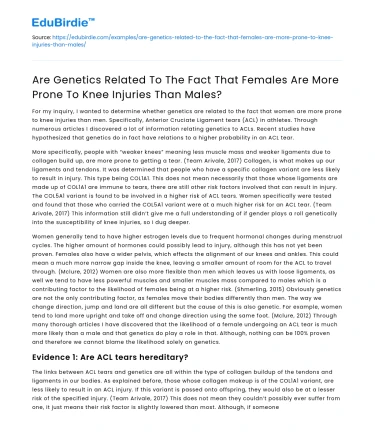For my inquiry, I wanted to determine whether genetics are related to the fact that women are more prone to knee injuries than men. Specifically, Anterior Cruciate Ligament tears (ACL) in athletes. Through numerous articles I discovered a lot of information relating genetics to ACLs. Recent studies have hypothesized that genetics do in fact have relations to a higher probability in an ACL tear.
More specifically, people with “weaker knees” meaning less muscle mass and weaker ligaments due to collagen build up, are more prone to getting a tear. (Team Arivale, 2017) Collagen, is what makes up our ligaments and tendons. It was determined that people who have a specific collagen variant are less likely to result in injury. This type being COL1A1. This does not mean necessarily that those whose ligaments are made up of COL1A1 are immune to tears, there are still other risk factors involved that can result in injury. The COL5A1 variant is found to be involved in a higher risk of ACL tears. Women specifically were tested and found that those who carried the COL5A1 variant were at a much higher risk for an ACL tear. (Team Arivale, 2017) This information still didn’t give me a full understanding of if gender plays a roll genetically into the susceptibility of knee injuries, so I dug deeper.
Women generally tend to have higher estrogen levels due to frequent hormonal changes during menstrual cycles. The higher amount of hormones could possibly lead to injury, although this has not yet been proven. Females also have a wider pelvis, which effects the alignment of our knees and ankles. This could mean a much more narrow gap inside the knee, leaving a smaller amount of room for the ACL to travel through. (Mclure, 2012) Women are also more flexible than men which leaves us with loose ligaments, as well we tend to have less powerful muscles and smaller muscles mass compared to males which is a contributing factor to the likelihood of females being at a higher risk. (Shmerling, 2015) Obviously genetics are not the only contributing factor, as females move their bodies differently than men. The way we change direction, jump and land are all different but the cause of this is also genetic. For example, women tend to land more upright and take off and change direction using the same foot. (Mclure, 2012) Through many thorough articles I have discovered that the likelihood of a female undergoing an ACL tear is much more likely than a male and that genetics do play a role in that. Although, nothing can be 100% proven and therefore we cannot blame the likelihood solely on genetics.
Evidence 1: Are ACL tears hereditary?
The links between ACL tears and genetics are all within the type of collagen buildup of the tendons and ligaments in our bodies. As explained before, those whose collagen makeup is of the COL1A1 variant, are less likely to result in an ACL injury. If this variant is passed onto offspring, they would also be at a lesser risk of the specified injury. (Team Arivale, 2017) This does not mean they couldn’t possibly ever suffer from one, it just means their risk factor is slightly lowered than most. Although, if someone with the COL5A1 variant, being the collagen type linked to weaker knees, leaving a higher possibility for injury passed that onto their offspring, the child would then most likely be at risk as well. Therefore, the possibility of a potential ACL tear/injury or lower-risk factor is hereditary, but it does not guarantee the outlook for that person. Someone with the COL5A1 collagen makeup could go through their entire life without suffering an ACL ailment, as well as someone with the COL1A1 variant could undergo an ACL related injury. This concludes that ACL tears alone, are not hereditary but it is the likelihood based upon the buildup of your collagen. (Team Arivale, 2017)
Evidence 2: Are ACL tears completely genetically related, or instead does it have to do with the movements during contact sports?
My research has shown me that quick jerky movements during sports and physical activity are factors that contribute to ACL tears. Sharp turns with planted feet, suddenly slowing down and changing direction, landing funny from jumping, and suddenly stopping. (ScienceDaily, 2012) The contact aspect of some sports can be a contributor as well. Full blows to the knee during sports due to tackles are plausible causes of ACL tears. (ScienceDaily, 2012) Again, the likelihood of tearing your ACL goes back into genetics meaning that genetics and movement are correlated. It’s not solely and completely genetically related, it connects to the different movements or scenarios that may cause injury. Movement is a large component in the tearing of ACLs, but is not the direct fault of the injury.
Overall, ACL tears are more commonly to be found in women based upon our genetic makeup and the ways our bodies move differently compared to men. The cause for the higher risk is not from genetics alone but a combination of many factors. Even though ACL tears are more common in women, there are still things we can to do gain some control and try to prevent it from happening ourselves. Things like strengthening exercises and informational workshops are extremely helpful when it comes to ACL tear prevention. (Shmerling, 2015)






 Stuck on your essay?
Stuck on your essay?

